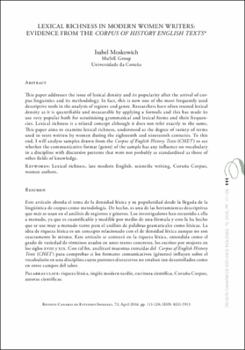Lexical richness in modern women writers: Evidence from the Corpus of History English Text
Autor
Moskowich, IsabelFecha
2016Resumen
Este artículo aborda el tema de la densidad léxica y su popularidad desde la llegada de la lingüística de corpus como metodología. De hecho, es una de las herramientas descriptivas que más se usan en el análisis de registros y géneros. Los investigadores han recurrido a ella a menudo, ya que es cuantificable y medible por medio de una fórmula y esto la ha hecho que se use muy a menudo tanto para el análisis de palabras gramaticales como léxicas. La idea de riqueza léxica es un concepto relacionado con el de densidad léxica aunque no son exactamente lo mismo. Este artículo se centrará en la riqueza léxica, entendida como el grado de variedad de términos usados en unos textos concretos, los escritos por mujeres en los siglos xviii y xix. Con tal fin, analizaré muestras extraídas del Corpus of English History Texts (CHET) para comprobar si los formatos comunicativos (géneros) influyen sobre el vocabulario en una disciplina cuyos patrones discursivos no estaban tan desarrollados como en otros campos del saber. This paper addresses the issue of lexical density and its popularity after the arrival of corpus linguistics and its methodology. In fact, this is now one of the most frequently used descriptive tools in the analysis of register and genre. Researchers have often trusted lexical density as it is quantifiable and measurable by applying a formula and this has made its use very popular both for scrutinising grammatical and lexical forms and their frequencies.
Lexical richness is a related concept although it does not refer exactly to the same, This paper aims to examine lexical richness, understood as the degree of variety of terms used in texts written by women during the eighteenth and nineteenth centuries. To this end, I will analyse samples drawn from the Corpus of English History Texts (CHET) to see whether the communicative format (genre) of the sample has any influence on vocabulary in a discipline with discursive patterns that were not probably as standardised as those of other fields of knowledge.





